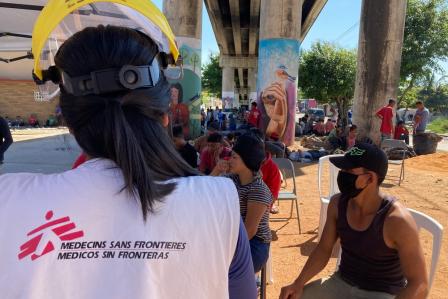Militarisation of borders and mass expulsions increase dangers for asylum seekers and migrants in Mexico
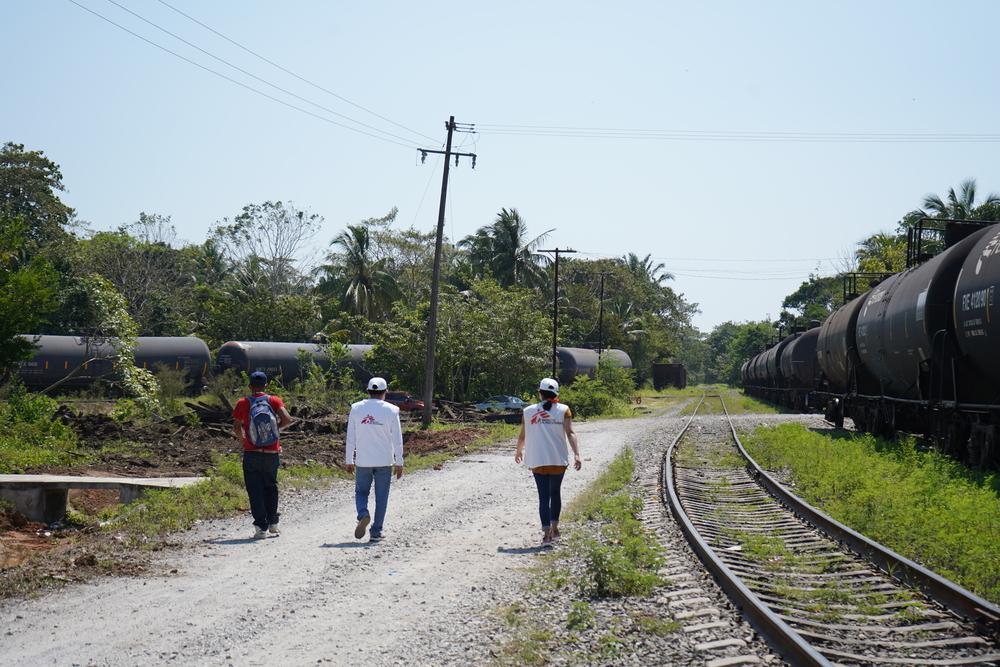
Doctors Without Borders/Médecins Sans Frontières (MSF) staff walk on the train tracks at the Higueras station in Veracruz looking for migrants who require medical, psychological and social work attention. In that area they are often victims of extortion by the guards and suffer violence at the hands of criminal groups at night. © Yesika Ocampo/MSF
The commitments announced last week between the United States, Mexico, Honduras and Guatemala to reinforce the militarisation of borders will further criminalise people on the move, says the international medical organisation Doctors Without Borders/Médecins Sans Frontières (MSF), leaving migrants more exposed to organised crime and COVID-19.
Doctors Without Borders has witnessed both repeated raids and arbitrary detentions on the southern border of Mexico and is also seeing asylum seekers forced back to Mexico by the US under the Title 42 order. This order has been misused to authorize mass expulsions ostensibly for public health reasons related to the COVID-19 pandemic, and effectively blocks the right to seek asylum in the US.
Once again we are seeing the construction of physical, bureaucratic, and security walls to block asylum and stop the free movement of people fleeing violence in their countries of origin. This is evident both on the northern and southern borders of Mexico. While the United States immediately blocks and expels newcomers en masse, Mexico represses and detains them en masse.Antonino Caradonna, project coordinator
Doctors Without Borders teams on Mexico’s southern border have repeatedly denounced the mass raids and arbitrary arrests in areas with a high concentration of migrants and asylum seekers, including near the organisation's healthcare posts. There have been several incidents in Coatzacoalcos, in the southern state of Veracruz, a railway hub that is widely used by people on the move.
“In fact, last week, raids were carried out in Coatzacoalcos on the railway tracks, and around 50 migrants, including families with children, were arbitrarily detained,” said Caradonna. “They were sleeping near the shelter because they are being denied accommodation, allegedly because of the pandemic.” Many shelters in Mexico have shut down or reduced capacity due to the pandemic.
Police action near shelters or places where migrants receive medical and humanitarian assistance “pushes people in transit to hide more, to opt for more dangerous routes, to be more vulnerable to organised crime and extortion,” said Caradonna. “We have to denounce the extreme lack of protection for these people.”
- "They arrest more women because they cannot run so much, they are carrying children"
I am 21 years old, I come from Honduras, from Tegucigalpa. In our country there is basically no work and there are many gangs. That is the reason we decided to emigrate, to seek a better life.
I'm going to the United States or as far as possible. If I can get to the United States, then it'll be the United States. Otherwise I will stay here in Mexico to see if I can get my paperwork sorted out, but at some point in the future, to stay in Mexico. They told me that Mexico City is beautiful and maybe I could stay there for a while. We are going to keep going forward on the train as far as possible and, God willing, to my destination. Back there they (the immigration agents) chased us, for about 40 minutes. We have to run because you can't let yourself be caught. Whilst running I hurt my arms a little on the wires of a fence, but thank God I managed to escape and we are heading north again. We have stayed in the hills and on the roads because so far we have not found any shelters or houses for migrants, and we have not been able to rest properly.
About 400 people came to the hills, but in the raid they caught about 200. There are fewer of us now than there were on the train. Half were women and the other half were men. Now very few women come, because they are the ones who get caught the most, because with children they can't run so far or fast. And men, well you know, they just run off wherever they can.
- Levi Josué Hernández Ramos
- "While my son sleeps, I keep watch"
I am 29 years old, I used to work in the fields. I have three children who are 15, 11 and 8 years old. I am travelling with my 11-year-old son, a fellow parishioner and his baby. My other children stayed with my mother in Honduras.
With the hurricanes in Honduras, I lost my house, I lost everything. I ended up on the street. My goal is to get to New York, where my brother is. It's been 20 days since I entered Mexico. We have slept in the hills, in the street, endured hunger and sleepless nights because we have no money. We could only find a shelter in Salto de Agua. We stayed there for two nights and from there we have just been walking and sleeping wherever we are when night falls.
The shelter here, (Casa del Migrante Diócesis de Coatzacoalcos) is closed. They have given us food and coffee, but we can no longer sleep inside. Yesterday I begged them to let me wash with my son because the truth was that we hadn't been able to for two days and they only let me in to wash with the two children, my parishioner's baby and my child, and then they took me out.
We eat thanks to the goodwill of the people.
They took from us the little money that we brought from Guatemala. At all the checkpoints they asked for 150 or 200 quetzals and threatened to deport us because they asked for my authorisation and passport. I have neither.
I am afraid of staying on the street because anything can happen to us. I am afraid that my son will be taken from me. I have not been able to sleep. I don't sleep because while my son sleeps, I keep watch.
I am also afraid of being deported to my country. The situation is very hard. If I had a job there, I would not risk my son, nor would I have left my other children there.
We go around asking for water, we fill the bottles and some people give us money to buy food. We always use masks, and gel, and I try to keep my distance from people.
My son is very tense and he says "Mummy, why don't we move on?" But I have to wait until the train leaves. One departed just now, but I didn't want to get on because there were a lot of people and I would rather wait for another ten trains, so my son can travel safely.
I feel sad about risking my son on this journey, and not being able to give him the comforts that other children have. What worries me most is his safety and not having money to give him food. It's what hurts me the most. His health has deteriorated a bit. Because sometimes they give me food, I tell him "eat everything, my love" and he says, "if you don't eat, I don't eat" and then I tell him "I'm not hungry". Even if I am, I tell him that so he can eat, but if I don't eat, he says he's not hungry either.
I say that if God gives me the opportunity to get there, my future will be different because my dream is to rebuild a home for my children and prepare them for life with studies, both for him and those I left in Honduras. To have a good job, no matter what it is, and help my family. To get there so my son has a place to sleep and to be able to rest in a safe place.
- Kimberly, from Copán Ruinas, Honduras
- "There are no shelters, the local people let us stay in their homes"
I've been on the road for eight days. When we arrived here (Coatzacoalcos), we washed our clothes, we had a wash and paid for wifi so we could let our relatives know that we are fine at the moment. We keep in contact with them because they are concerned and so they know that we are okay. Everything is going well, thank God. I'm a little tired from the long walks. Now quite a lot of people are coming. There were about 500 of us who came here from Chontalpa, but they chased us in El Limonar and caught many people. We slipped through the hills and got away, thank God, but many have already lost their dream to reach the United States. It's the end of the road for them because they are sent back to their country. They caught more women with their children because they travel inside the train and it is more difficult for them to jump off and flee into the hills. Many families come with children, both mothers and fathers with their children.
The situation is very difficult, that is why we are in a foreign country. I think that Biden has helped many people, he has given many families, fellow countrymen, the opportunity to stay, so here we come.
We have not suffered robberies. Now the thieves are the Mexican police because they take away the little money that we have in order to survive. If they catch you they will make you pay to continue on your way. There are no shelters, only compassionate people who shelter us, without any problem, in their homes and you appreciate that because you no longer have to take the risk of sleeping in the hills. We are going to rest here in Coatzacoalcos to gather strength. The goal is to keep going forward.
- Roger Ramos, a 39-year-old man from the department of Francisco Morazán in Honduras
Asylum seekers and migrants at risk
The testimonies collected by Doctors Without Borders in the area corroborate the increase in raids and arrests on Mexico’s southern border, which put the physical and mental health of asylum seekers and migrants at risk.
Seeking asylum – and a better life
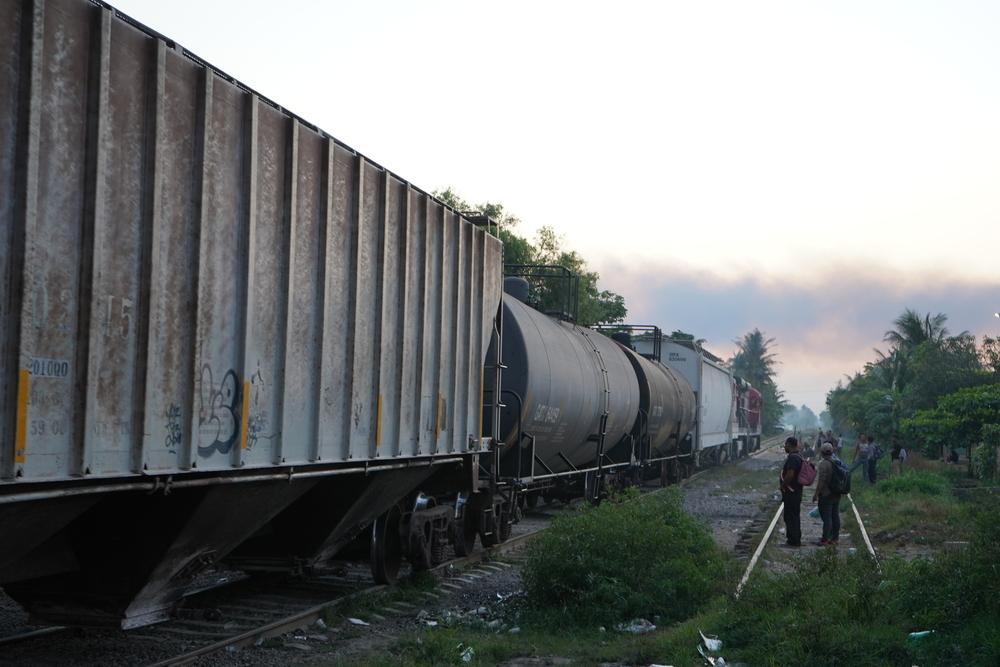
The freight train that crosses Mexico, known as La Bestia, is the usual means of transport for migrants to reach the northern border. © Yesika Ocampo/MSF
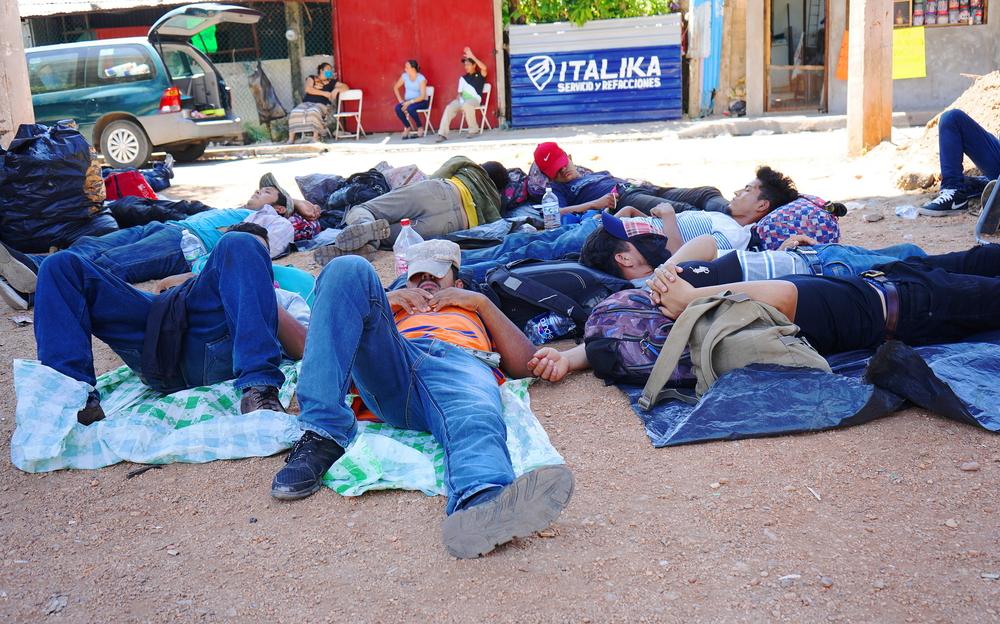
Migrants who arrive in the City of Coatzacoalcos sleep outside the Casa del Migrante Diocesis of Coatzacoalcos because it is denying them shelter for the night. © Yesika Ocampo/MSF
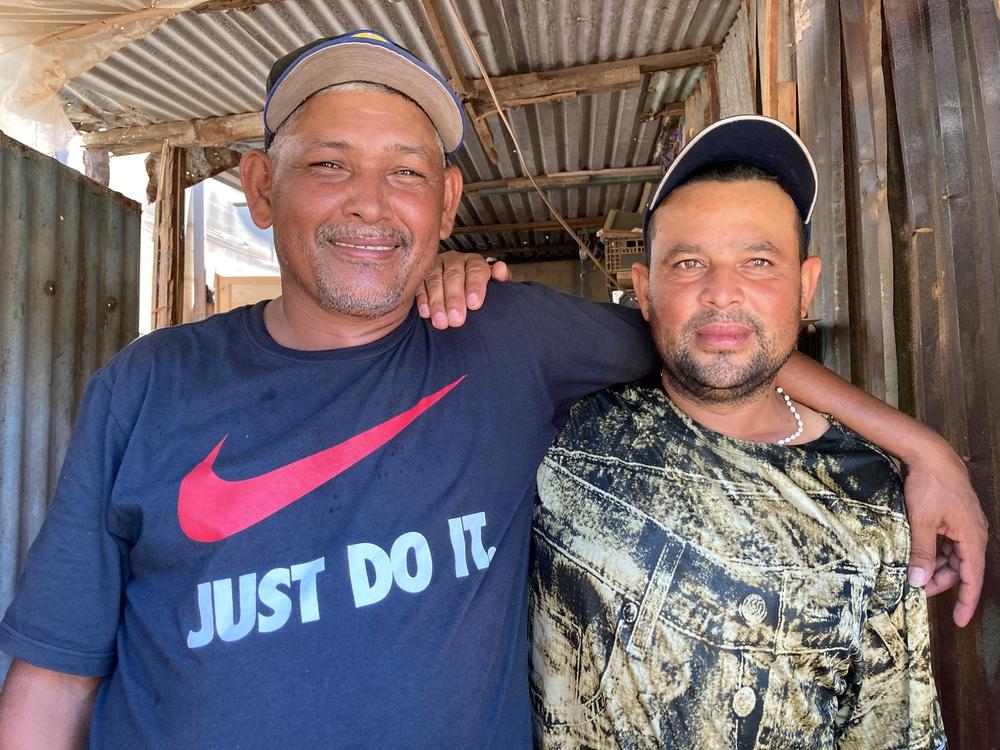
Roger Ramos, a 39-year-old man from Honduras from the department of Francisco Morazán. "We have come to Coatzacoalcos. There are no shelters, only humanitarian people who shelter us. That is appreciated because one no longer sleeps in the open in danger. On the way from Chontalpa we were about 500 people but the authorities arrested many people, especially women with their children because it is already more difficult for them to jump from the trains and flee." © Yesika Ocampo/MSF
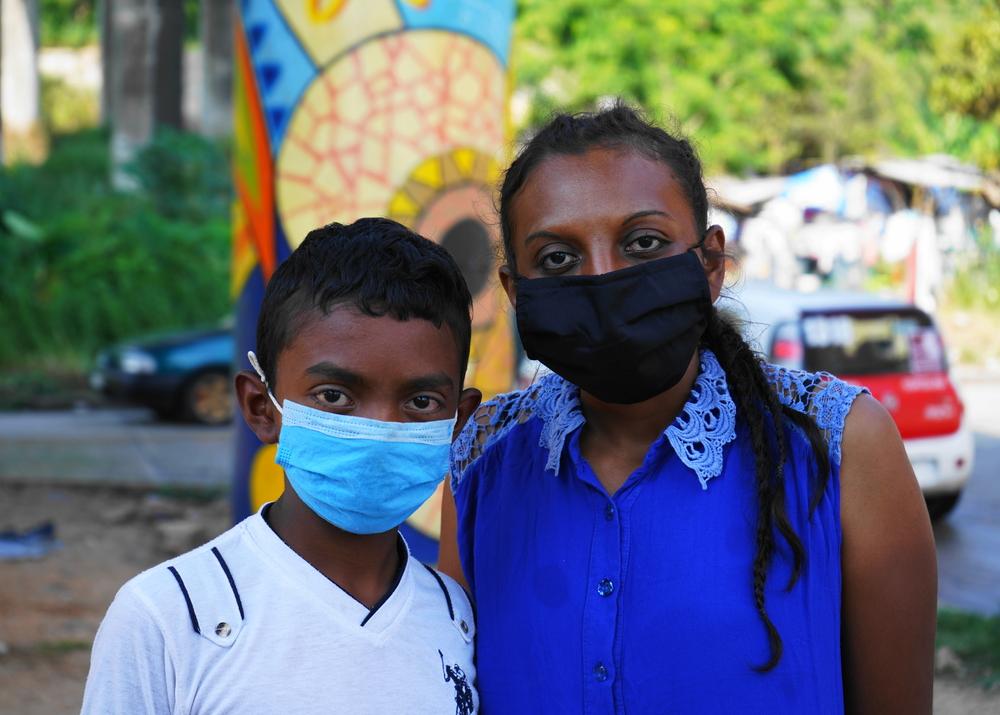
Kimberly worked in the fields. She is traveling with her 11-year-old son. She had to leave her other children in Honduras. She wants to go to NY and get a job, because with the hurricanes she lost her house and her source of work. She has been traveling for 20 days, she has endured hunger and lack of sleep. She has had to sleep on the street with her son because it is not easy to find shelters. © Yesika Ocampo/MSF
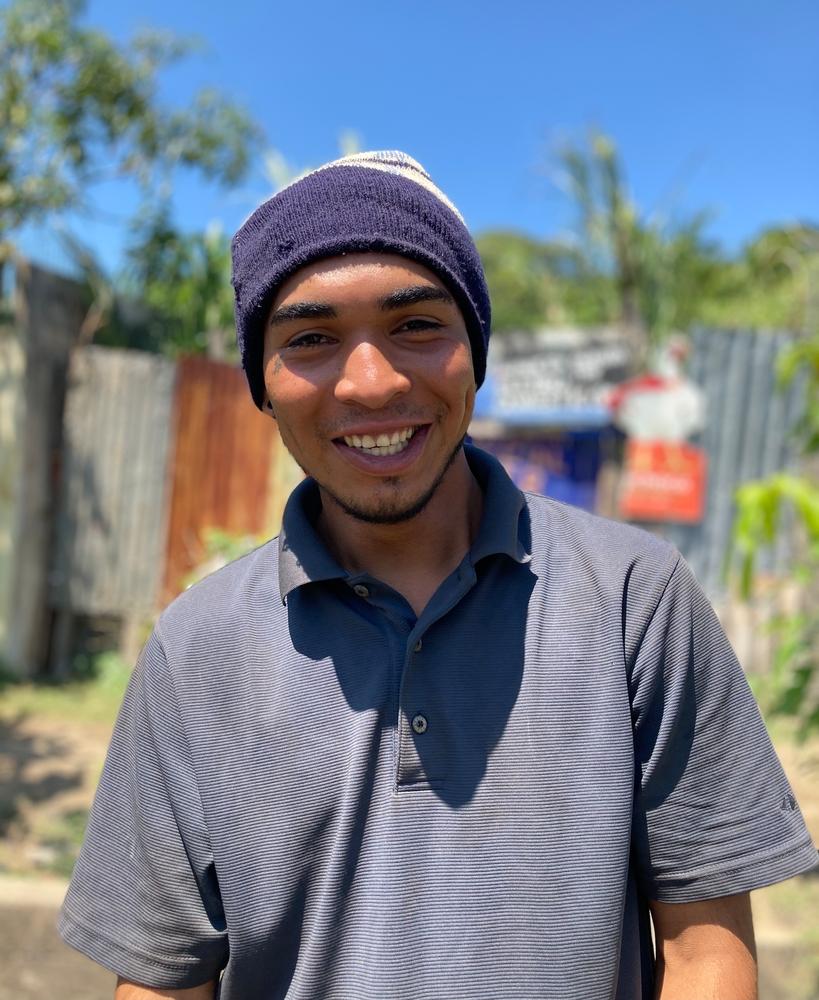
Levi Josué Hernández Ramos, 21, from Honduras, from Tegucigalpa. "In our country there is no job and and there are many gangs. That is the reason why we decided to emigrate, to seek a better life. Back there they chased us (immigration agents). I hurt my arms a little bit with a fence, but I managed to escape. We have stayed in the mountains and on the rail tracks because we have not found any shelter and we have not been able to rest well." © Yesika Ocampo/MSF
Along Mexico’s northern border, Doctors Without Borders teams are witnessing the increase in mass expulsions from the US of asylum seekers and migrants under the Title 42 order. These individuals are returned to Mexico without due process to unfamiliar and often dangerous cities along the northern border. In Reynosa, Nuevo Laredo and Ciudad Juárez, Doctors Without Borders teams have provided medical assistance to hundreds of deported families, now stranded, awaiting protection.
“Our teams give an account of the inhumane treatment migrants receive in detention centres in the US, the impact it has on their health, and the acute stress they carry with them,” said Geaninna Ramos, Doctors Without Borders medical adviser. “They are being deported to border cities in Mexico, without any information about where they are and what they are going to do next. There are many women with children in their arms, who haven't eaten or received dignified treatment while in detention, and without COVID-19 prevention measures in place. We treated a 4-year-old girl who arrived in Ciudad Juárez dehydrated, because she was not even given water in the [holding] cells in the United States.”
I had entered through the Reynosa border crossing, and they sent me back to Nuevo Laredo. I had no way of communicating with anyone. Immigration officers treat you badly. You ask a question and they yell at you, they push you. To search the minors, they put them all against the bus with their hands up and pushed them. I thought about my son. I did not want to think that my son would be beaten, because I saw how they pushed them around to search them. They treat us badly. We are fleeing and we have no intention of harming anyone, but I don't think everyone understands that.María, travelling with her daughter
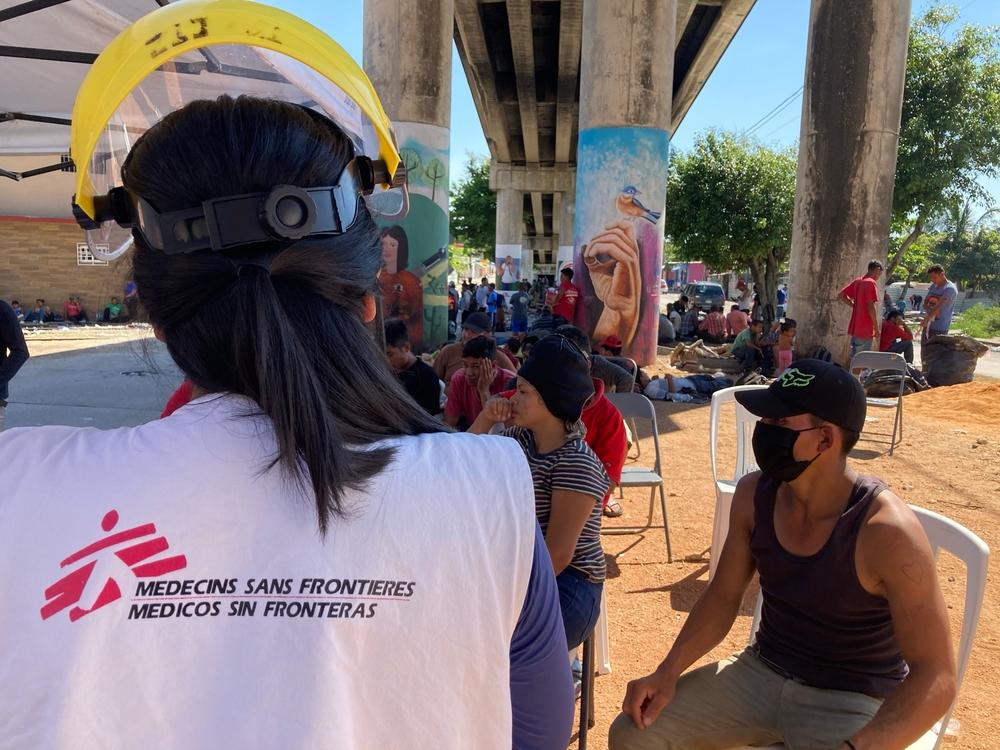
Doctors Without Borders has witnessed both repeated raids and arbitrary arrests on Mexico's southern border. © Yesika Ocampo/MSF
The lack of protection for asylum seekers and migrants, the lack of adequate humanitarian assistance, the lack of inclusion in COVID-19 prevention efforts, the criminalisation of people forced to flee, their vulnerability to criminal gangs that engage in kidnapping, extortion and trafficking—these are not new problems.
“We have seen these harmful migration policies in the past,” said Caradonna. “We know that they do not discourage migrants, but only push them to hide and go down more dangerous roads, where they may be more exposed to organised crime, turn to human traffickers and risk their lives.”
As stated earlier this month by a spokesperson for the US administration, the increased security presence in the region is intended to deter migration: “The objective is to make it more difficult to make the journey, and make crossing the borders more difficult.”
“We have to be clear and look deeply at these policies,” said Caradonna. “Making the journey more difficult for migrants means making it more lethal.”
Doctors Without Borders once again calls on the US, Mexico, and other governments in the region to end these repressive migration policies. Asylum seekers and migrants must be guaranteed protection and adequate humanitarian assistance in accordance with domestic and international laws and norms. In the context of the COVID-19 pandemic, efforts must be made to protect migrants from the virus through the provision of sufficient shelters and safe spaces.
The deportees under Title 42 who entered through Reynosa are being returned to Ciudad Juárez and Nuevo Laredo. In Ciudad Juárez, they are stalked by human traffickers who are out to kidnap and extort them, and in Nuevo Laredo, deportees who are not in shelters are exposed to frequent shootings. The migrants we assist in the shelters choose not to go outside because there are shootings almost every day.Ivanna Servín, psychologist
